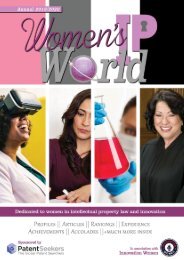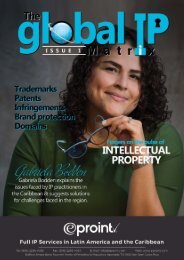Global IP Matrix - Issue 8
Dear Readers We are delighted to present you with issue 8 of The Global IP Matrix magazine! Once again, we have fantastic content delivered to you by industry professionals who are experts in their field. This issue explores IP & Innovation in Africa, anti-counterfeiting measures in the Caribbean, IPR Infringement in China, plus many more engaging articles around the IP ecosystem. It's been a challenging few months; however, we are grateful that our clients and contributors share our vision. Together, we are heading for better times. We cannot thank our authors enough for their time and efforts to keep you, our audience up to date with news and stories from their own perspective and expertise. Look out for our next edition, in January 2021 and until then, stay safe, healthy & happy. Elvin Hassan – Editor
Dear Readers
We are delighted to present you with issue 8 of The Global IP Matrix magazine!
Once again, we have fantastic content delivered to you by industry professionals who are experts in their field.
This issue explores IP & Innovation in Africa, anti-counterfeiting measures in the Caribbean, IPR Infringement in China, plus many more engaging articles around the IP ecosystem.
It's been a challenging few months; however, we are grateful that our clients and contributors share our vision. Together, we are heading for better times.
We cannot thank our authors enough for their time and efforts to keep you, our audience up to date with news and stories from their own perspective and expertise.
Look out for our next edition, in January 2021 and until then, stay safe, healthy & happy.
Elvin Hassan – Editor
You also want an ePaper? Increase the reach of your titles
YUMPU automatically turns print PDFs into web optimized ePapers that Google loves.
jurisdictions like Suriname follow the ‘first to
use’ system, it is always advisable to register all
IP assets based on the above. Additionally, it
is necessary to mention that it is mandatory
to have a valid registered trademark to start
judicial actions in many Caribbean islands.
Another strategy is to train consumers and
local customs authorities about counterfeiting.
It is also advisable that brand owners know
how their counterfeiters’ business is run; that
is, knowing where they are located, how they
operate and how their supply chain runs,
from production to the final delivery of the
product. Likewise, it is possible to hire special
investigators and contract intelligent platforms
that monitor possible counterfeits found on
web pages such as Alibaba, for example.
The above will help proceed with a possible
seizure, closure of the manufacturing plant,
and initiation of a judicial process. Whether
or not to proceed with these actions against
counterfeiters will depend on the number
of pieces involved as well as the costs. Brand
owners shall seek a balance between what
the aforementioned counterfeiting means for
them, the expenses of the legal process, and
how much they would receive in compensation
from the counterfeiter.
By the same token, it is of the utmost importance
that all countries join forces to help brand
owners to enforce their IPRs. That is, even
if proprietors have all their trademarks and
other IPRs registered and secured. Even if they
monitor their counterfeiters, the campaign can
only be successful if IP legislation worldwide
is extremely robust. Likewise, countries need
to count on strong customs authorities and
local systems capable of detecting and seizing
counterfeiting goods. The latter appears to be a
fundamental pillar when speaking about anticounterfeiting
campaigns because it is the last
step before the end user receives the goods.
This also gives information on who are the local
distributors of the manufacturer. However, as
is seen in the next section, some Caribbean
islands lack regulation on this aspect.
III. Anticounterfeiting
measures in the Caribbean:
the demand of a new era
As mentioned, the situation in the Caribbean
should be highlighted. It is observed that
each island has different legislations. This
makes it difficult to IPRs holders to manage
and administer their intellectual property.
However, the most disturbing aspect is the
fact that most of these islands do not have any
border measures. The situation of some of the
islands will be shown below:
*Trinidad & Tobago, Dominican Republic, St.
Lucia: these islands have a system whereby a
Notice of Objection to the Importation of
counterfeit goods can be filed at customs.
When allegedly counterfeit products arrive,
customs authorities notify the owner or his
representative. There is a deadline to initiate
or not initiate legal actions, but the pieces are
retained during the term.
*Jamaica, Turks &
Caicos and Grenada:
are examples of islands
in which the proprietor
or licensee of a
registered trademark
can by notice in writing
to the comptroller
of customs indicate
that they believe
counterfeit or pirated
goods in relation to
the said trademark,
are expected to arrive
and request that
the comptroller of
customs inform the
writer if and when this
occurs. These kinds
of regulations are not
proper as the owner
probably does not
know when counterfeit
products will arrive in
that particular country;
undoubtedly, this type
of information may be
challenging to obtain.
*Haiti, Bahamas,
British Virgin Islands,
St. Kitts & Navis,
Cayman Islands,
Barbados and Anguilla
are all examples of
islands that do not
have any customs
registration. Therefore,
it is needed to hire a
private investigator
who acts as a ‘mystery
shopper’.
Furthermore, once
the goods are seized,
it is necessary that
countries all around the
world have regulations
that allow easy access
to justice to initiate
civil, criminal, or
administrative actions.
This is enshrined in
the TRIPS Agreement as an obligation of all
contracting parties. However, only eight out
of twenty-six Caribbean Islands are signatory
members of the TRIPS Agreement (i.e.,
Barbados, Belize, Cuba, Dominican Republic,
Dominica, St. Kitts & Navis, St. Lucia, and
Trinidad and Tobago). Despite all, the other
islands are not a signatory of the TRIPS
Agreement; they do have civil, criminal, and
administrative procedures. However, the key is
on the efficiency of the process.
The above denotes that the legislation is not
only ununiform, but it is also insufficient. This
puts brand owners at a high-risk position that
gets worse, given the immensity and ease of
internet access to acquire counterfeit goods.
Finally, it is recommendable
that Caribbean islands come
together to agree on minimum –
and uniform– criteria for border
measures so that customs agents
have the capacity and authority
to seize allegedly counterfeit
products. The same applies
to enforcement measures; all
Caribbean islands should have
minimum rules for the proper
functioning of their civil, criminal,
and administrative procedures
concerning counterfeiting
matters. Undoubtedly, these
reforms will benefit not only IPRs
holders but the international
community as a whole.
Specialist global search services for patent attorneys,
universities, technology companies and SME’s
Patentability/Novelty Search
Infringement/FTO/Clearance
Invalidity/Patent Busting
State of the Art
Patent Mapping/Landscapes
Patent Monitoring
Patent Status
Competitor Analysis
Tel: +44 (0)1633 816601
Email: mail@patentseekers.com
www.patentseekers.com
34 www.gipmatrix.com












